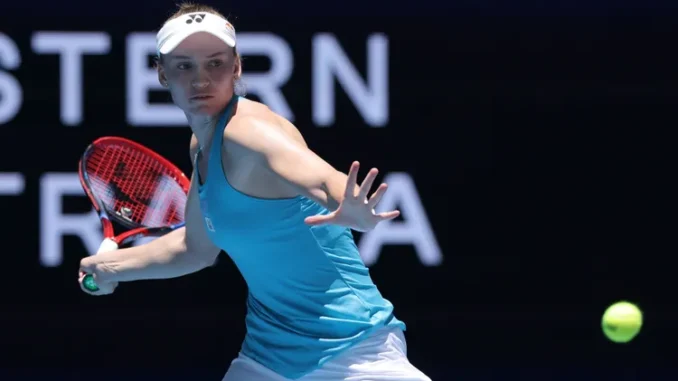
“She never came to me personally, never talked with me”: Elena Rybakina defends Stefano Vukov after criticism from Pam Shriver
Elena Rybakina, the reigning Wimbledon champion, has come forward to defend her coach Stefano Vukov after he faced public criticism from former tennis player and current analyst Pam Shriver. The controversy began when Shriver commented on Vukov’s courtside behavior, labeling it overly intense and potentially disrespectful during Rybakina’s matches at the Australian Open.
Shriver, known for her candid opinions, highlighted moments during Rybakina’s matches where Vukov appeared animated, gesturing emphatically from the player’s box. To Shriver, these interactions seemed excessive, and she suggested that Rybakina might benefit from re-evaluating her coaching relationship. However, Rybakina has firmly dismissed these critiques, emphasizing her trust in Vukov and expressing disappointment with how Shriver voiced her concerns.
Speaking to reporters, Rybakina addressed the controversy, making it clear that she stands by her coach. “Stefano has been instrumental in my development as a player,” Rybakina stated. “I wouldn’t have achieved what I have without his guidance and support. It’s easy for outsiders to make judgments based on what they see for a few moments on TV, but they don’t know the dynamic we share or how much work goes into our partnership.”
Rybakina took particular issue with the manner in which Shriver raised her concerns. “She never came to me personally, never talked with me about how I feel or what I think about Stefano,” Rybakina said. “Instead, she chose to comment publicly, which I feel was inappropriate and unnecessary.”
The Importance of the Coach-Player Dynamic
The relationship between a coach and a player is one of the most vital aspects of a professional tennis career. It requires a delicate balance of trust, communication, and mutual respect. Rybakina’s comments underscore the importance of understanding this dynamic from an insider’s perspective rather than jumping to conclusions based on surface-level observations.
Vukov has been part of Rybakina’s journey for several years, guiding her from being a talented prospect to one of the most formidable players on the WTA Tour. Under his guidance, she won her first Grand Slam title at Wimbledon in 2022, a feat that marked a significant milestone in her career. Rybakina credits her success to the discipline and strategies instilled by Vukov, whom she regards as a crucial part of her team.
“Every coach has a different style,” Rybakina explained. “Stefano is passionate, and his energy motivates me. I know some people might perceive it differently, but that’s their opinion. For me, it works. We’ve built a strong partnership based on respect and understanding, and that’s what matters.”
Pam Shriver’s Perspective and the Broader Debate
Pam Shriver, a former doubles champion and a vocal advocate for player welfare, has often used her platform to call out behaviors she perceives as harmful or detrimental to athletes. Her criticism of Vukov stems from a broader discussion about coaching conduct in tennis, particularly when it comes to interactions that could be perceived as overly harsh or emotionally taxing for players.
Shriver’s comments sparked a heated debate within the tennis community. Some echoed her sentiments, agreeing that a coach’s demeanor can significantly impact a player’s performance and well-being. Others defended Vukov, arguing that his actions were misinterpreted and that his passion is part of his commitment to Rybakina’s success.
While Shriver has yet to respond directly to Rybakina’s defense of Vukov, her initial remarks have ignited a broader conversation about where to draw the line between constructive coaching and behavior that crosses into negativity.
Rybakina’s Journey at the Australian Open
Amid the controversy, Rybakina has continued to let her tennis do the talking. Her performances at the Australian Open have been a testament to her growing stature as one of the sport’s top players. She advanced to the final with a series of commanding wins, including a stunning victory over top-seeded Iga Swiatek in the fourth round.
Rybakina’s calm demeanor on the court, combined with her powerful groundstrokes and precise serving, has made her a formidable opponent. Despite the distractions off the court, she has maintained her focus and delivered consistently strong performances, further solidifying her reputation as a player to watch.
When asked how she manages to stay focused amid external distractions, Rybakina credited her team, including Vukov, for keeping her grounded. “Tennis is full of ups and downs,” she said. “Having a team that believes in you and supports you is crucial. Stefano has always been there for me, and I trust him completely.”
Moving Forward
As Rybakina continues her quest for more Grand Slam glory, she remains resolute in her support for Vukov. Her public defense of him not only highlights her loyalty but also serves as a reminder that the dynamics within a player’s camp are often far more complex than they appear.
In an era where social media and public commentary can amplify controversies, Rybakina’s response is a call for understanding and restraint. By addressing the issue head-on, she has reaffirmed her commitment to her team and her belief in the partnership that has brought her so much success.
“I hope people can respect my choices and see the bigger picture,” Rybakina concluded. “At the end of the day, what happens on the court and in my team is what’s most important.”
As the tennis world continues to debate the nuances of coaching relationships, Rybakina’s perspective adds a valuable layer to the conversation. For now, she remains focused on her game, determined to add more titles to her growing list of accomplishments—with Vukov by her side.
Leave a Reply